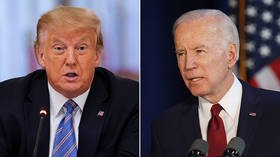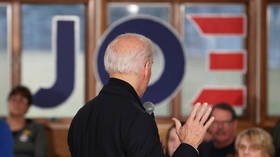Staying quiet has served Biden well so far, but when he finally comes out of his basement it’s Trump who will most likely benefit

Joe Biden has forged a healthy lead in the US election polls without having to do or say too much thanks to lockdown. But will he survive head-to-head debates and scrutiny of his spending plans with his lead intact?
At the moment, circumstances could hardly be more favorable for Joe Biden. Partly through design, but largely due to circumstances, his deficiencies have been significantly obscured by the dynamics and restrictions of his campaign, conducted largely from his Delaware home.
He has been able to dictate the tempo of his appearances, have them well scripted and managed in advance. He has been able to appear composed, measured, and disciplined. His social media appearances have been comparatively short, unless such online interactions are with sympathetic people from key Democratic Party demographics, to whom he can almost effortlessly relate after so many decades of public service.
In such online appearances, he has been able to heavily emphasize folksy self-reflection, personal anecdotes, and demonstrate his empathy, more than once recounting the tragedies of his past to guests who are enduring their own tragedies amidst the present crisis.
By the former vice president’s standards, the discipline has been unusually consistent. The last instance of a gaffe was when talking to an African-American commentator on social media, he exclaimed, “If you have a problem figuring out whether you’re for me or Trump, then you ain’t black.”
That was two months ago – an extraordinarily long stretch for any candidate to go gaffe-free, let alone Joe Biden. The rare public appearances beyond his home have been tightly scripted, scarcely lasting longer than a strictly prescribed half-hour stump speech, read from a teleprompter.
Sessions with the media have been, by necessity, quite rare. And with the literal physical separation between journalists, there hasn’t been the usual dynamic of squabbling and overlapping voices clamoring for attention in a press scrum, further reducing the possibility of any pressure on the candidate, who has been able to respond at his own leisure.
At these rare events, there has been no need for him to go into policy detail, the kind that might lead to scrutiny, or raise the prospect of competing priorities. Thus far, there has been little need for him to account for any expenditure, or lay out any timetable; all he has had to do is respond to the issues of the day, and the president’s latest controversies, as the voice of common sense and reason.
With a rapid-response communications team putting together conventional talking points, he has been able to stick to the general themes he has maintained from the very beginning, further reinforcing the idea of him as a serious and common-sense candidate. There has been little scope for error, and no need for him to respond spontaneously to anything. In an extremely rare situation for a candidate in the midst of a presidential election, he has been able to get an ample amount of sleep each day, and enjoy a generous amount of downtime – the two things a 77-year-old candidate would most ideally want.
Also on rt.com Introducing Kanye Derangement Syndrome: Chance the Rapper asks why Joe Biden would be better than Yeezy… and the left goes crazyThis cannot last. Trump seems to be flailing, receiving poor marks for his Covid-19 response, and with his re-election prospects darkened by a new wave of shut-downs. Another critical reason for seeming so out-of-sorts is the lack of a focal point for the campaign.
Trump, who generally has a canny instinct for how to frame opponents, has been struggling over the last few weeks to find a compelling line of attack against Biden. This is due, in part, to the fact the former vice president has been largely out of the fray, and has not given Trump anything to work with.
The most obvious change to this dynamic will be the upcoming debates. Although Biden had a lot of practice through the primaries, the general consensus was that his performances were adequate at best, and often sloppy. One-on-one debates with Donald Trump will be a different beast. Instead of having a large amount of neutral time during each encounter, with his remarks divvied up among three, four, or 10 other candidates on stage, as it was during most of the Democratic primaries, his reserves of stamina will be greatly tested by sharing the stage and having to be on form for exactly half the time.
He will also be facing an opponent who, unlike Bernie Sanders, thrives on interruptions, antagonism, and unpredictability. Trump will be prepped to be disruptive. The president’s minders, for all the vacillations and dysfunction, firmly believe that their candidate can bully Biden on stage, and they proposed, for a time, expanding the number of debates for the very purpose of trying to push him into a gaffe or some form of exposure or spell of disorientation, which they could then cut-up into campaign ads, to reinforce their ‘cognitive decline’ line of attack.
Secondly, at some stage, Biden will have to disclose his spending proposals and policy priorities. Right now, much of that is in the abstract, but eventually, when the American public begins to pay more attention, they will have their own views on what is sensible and acceptable spending.
Moderate and independent voters may not be especially drawn to the idea of the ‘green new deal’ when it is held up to scrutiny, while liberal and progressive supporters may be turned off by policy proposals that don’t seem to go far enough. In interviews, especially with outlets that may not be so amenable, he may get tripped up trying to explain the details of his policies.
Travel will also play a part, even during a Covid-compromised campaign. He will have to visit key swing states and there will inevitably be a drag on his stamina, providing the potential for him, in a fatigued state, to get details wrong about the state or town that he’s in.
Campaigns traditionally tend to tighten up, even ones featuring a clear favorite and an underdog. Right now, there is a sense of high optimism among the Democratic base and amongst Democratic operatives that they are expanding the Electoral College map.
A closer look at Trump’s approval ratings indicates that he has only really dipped down from his consistent average of about 41 to 42 percent to a present low of 40 percent in the average of the polls. This has happened several times in the past and there is scope for even a patchy or gradual economic recovery, and the natural tightening of a campaign, for this rating to rise up a couple of points, back to Trump’s traditional very narrow band in the polls.
Also on rt.com Is it in the bag, Joe? 5 times the Democrats blew a winnable electionWere this to happen, the Republican-leaning states that Democrats have been looking at, such as Iowa, Ohio, or Georgia, may recede back out of contention, and the number of battleground states will shrink. Even a slight reduction in the spread of genuine battleground states – back to the six or seven most analysts have been forecasting for months – would make the election a genuine competition again.
While Biden has quite a strong lead nationally, at around nine percent in the RealClearPolitics average, his overall advantage in the swing states is about half that. So a tightening of even a small degree of Trump’s poll numbers will mean there will be a correspondingly relatively sharp tightening up in those decisive states.
A further aspect is that, even at this seeming nadir of his presidency, the Republican base has stuck with the president to a startling degree, suggesting that enthusiasm is undimmed. This could be a great asset on election day. Whilst there is a great affinity and liking for Joe Biden, there isn’t the same visceral enthusiasm; although, of course, neither is there the corresponding visceral hatred.
President Trump would probably lose the election in a landslide were it held tomorrow. But for all his woes, he still has four months to mount some kind of comeback – and with the scars of 2016 still deep for many on the left, no one will be truly convinced of anything until election night.
Think your friends would be interested? Share this story!
The statements, views and opinions expressed in this column are solely those of the author and do not necessarily represent those of RT.

















